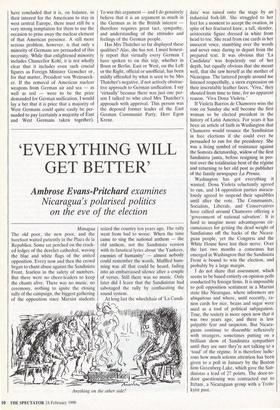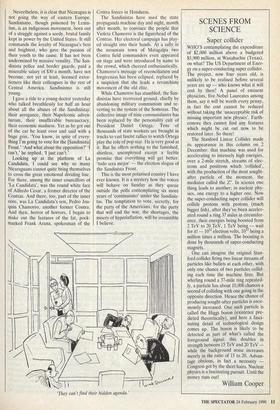'EVERYTHING WILL GET BETTER'
Ambrose Evans-Pritchard examines
Nicaragua's polarised politics on the eve of the election
Managua The old poor, the new poor, and the barefoot waited patiently in the Plaza de la Republica. Some sat perched on the crack- ed ledges of the derelict cathedral, waving the blue and white flags of the united opposition. Every now and then the crowd began to chant abuse against the Sandinista Front, fearless in the safety of numbers. But there were no cheer-leaders to keep the chants alive. There was no music, no ceremony, nothing to ignite the closing rally of the campaign, the biggest gathering of the opposition since Marxist students
seized the country ten years ago. The rally went from bad to worse. When the time came to sing the national anthem — the old anthem, not the Sandinista version with its fanatical lyrics about 'the Yankees, enemies of humanity' — almost nobody could remember the words. Muffled hum- ming was all that could be heard, fading into an embarrassed silence after a couple of verses. Still there was no music. Only later did I learn that the Sandinistas had sabotaged the rally by confiscating the sound system.
At long last the wheelchair of 'La Candi-
Anything on the other side?
data' was raised onto the stage by an industrial fork-lift. She struggled to her feet for a moment to accept the ovation, in spite of her fractured knee, a tall, slender, aristocratic figure dressed in white from head to toe. She read from cue cards in her innocent voice, stumbling over the words and never once daring to depart from the prepared text. It was obvious that 'La Candidata' was hopelessly out of her depth, but equally obvious that she meant well, that she saw herself as the mother of Nicaragua. The tattered people around me listened respectfully, a stern expression on their inscrutable leather faces. 'Viva,' they shouted from time to time, for no apparent reason. 'Viva Dona Violeta.'
If Violeta Barrios de Chamorro wins the vote on Sunday she will become the first woman to be elected president in the history of Latin America. For years it has been an article of faith in Washington that Chamorro would trounce the Sandinistas in free elections if she could ever be persuaded to run for the presidency. She was a living symbol of resistance against the Somoza dictatorship, widow of the first Sandinista junta, before resigning in pro- test over the totalitarian bent of the regime and returning to her old post as publisher of the family newspaper La Prensa.
Washington has got everything it wanted. Dona Violeta reluctantly agreed to run, and 14 opposition parties miracu- lously agreed to suspend their squabbles until after the vote. The Communists, Socialists, Liberals, and Conservatives have rallied around Chamorro offering a 'government of national salvation'. It is hard to imagine more advantageous cir- cumstances for getting the dead weight of Sandinismo off the backs of the Nicara- guan people, yet the Congress and the White House have lost their nerve. Over the last two months a consensus has emerged in Washington that the Sandinista Front is bound to win the election, and probably by a large margin.
I do not share that assessment, which seems to be based entirely on opinion polls conducted by foreign firms. It is impossible to poll opposition sentiment in a Marxist state like Nicaragua, where informers are ubiquitous and where, until recently, ra- tion cards for rice, beans and sugar were used as a tool of political subjugation. True, the society is more open now that it was two years ago, and there is less palpable fear and suspicion. But Nicara- guans continue to dissemble reflexively with strangers, sometimes putting on a brilliant show of Sandinista sympathies until they are sure they're not talking to a 'toad' of the regime. It is therefore ludic- rous how much solemn attention has been given to a poll in January by the Boston firm Greenberg-Lake, which gave the San- dinistas a lead of 27 points. The door-to- door questioning was contracted out to Itztani, a Nicaraguan group with a Trots- kyist past.
Nevertheless, it is clear that Nicaragua is not going the way of eastern Europe. Sandinismo, though poisoned by Lenin- ism, is an indigenous movement, born out of a struggle against a seedy, brutal family kept in power by the United States. It still coinmands the loyalty of Nicaragua's best and brightest, who gave the passion Of their youth to the cause. It has not been undermined by massive venality. The San- dinista police and border guards, paid a miserable salary of $30 a month, have not become, not yet at least, licensed extor- tioners like their colleagues in the rest of Central America. Sandinismo is still young.
I gave a ride to a young doctor yesterday who talked breathlessly for half an hour about all the abuses of the Sandinistas: their arrogance, their Napoleonic adven- turism, their insufferable bureaucracy, their economic madness. Yet as he got out of the car he leant over and said with a huge grin, 'You know, in spite of every- thing I'm going to vote for the [Sandinista] Front.' And what about the opposition?"I can't,' he replied, 'I just can't.'
Looking up at the platform of La Candidata, I could see why so many Nicaraguans cannot quite bring themselves to cross the great emotional dividing line. For there, among the inner councillors of 'La Candidata', was the round white face of Alfredo Cesar, a former director of the Contras. And there, too, part of the inner core, was La Candidata's son, Pedro Joa- quin Chamorro, another former Contra. And then, horror of horrors, I began to make Out the features of the fat, pock- marked Frank Arana, spokesman of the Contra forces in Honduras.
The Sandinistas have used the state propaganda machine day and night, month. after month, to convince the people that Violeta Chamorro is the figurehead of the Contras. Her electoral campaign has play- ed straight into their hands. At a rally in the mountain town of Matagalpa two Contra field commanders even appeared on stage and were introduced by name to the crowd, which cheered enthusiastically. Chamorro's message of reconciliation and forgiveness has been eclipsed, replaced by a suspicion that she leads a revanchiste movement of the old elite.
While Chamorro has stumbled, the San- dinistas have recovered ground, chiefly by abandoning military communism and re- verting to the system of the Somozas. The collective image of nine commandantes has been replaced by the personality cult of President Daniel Ortega. Tens of thousands of state workers are brought in trucks to vast fascist rallies to watch Ortega play the role of pop star. He is very good at it. But he offers nothing to the famished, shirtless, unemployed except a feeble promise that everything will get better: `todo sera mejor' — the election slogan of the Sandinista Front.
This is the most polarised country I have ever known. It is a mystery how the voters will behave on Sunday as they queue outside the polls contemplating six more years of `continuismo' under 'she Sandinis- tas. The temptation to vote, secretly, for the party of the Americans, for the party that will end the war, the shortages, the misery of hyperinflation, will be irresistible I believe.
'They can't find their hidden agenda.'



















































 Previous page
Previous page